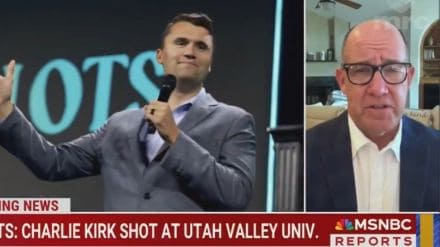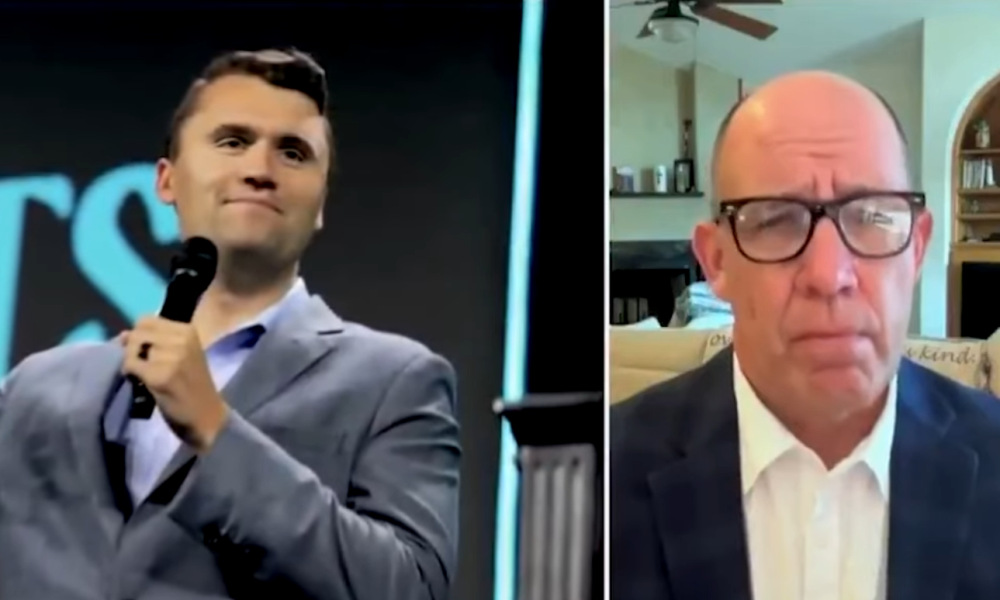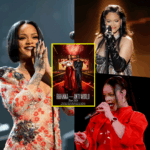Matthew Dowd Fired From MSNBC After Controversial Comments About Charlie Kirk’s Death

Political analyst Matthew Dowd has been fired from MSNBC following backlash over comments he made regarding the death of conservative activist Charlie Kirk. The comments, made during MSNBC’s coverage of Kirk’s tragic shooting, have sparked heated debate over free speech, political rhetoric, and accountability in the media.
Dowd’s Controversial Remarks
The controversy began when MSNBC anchor Katy Tur asked Dowd about the “environment in which a shooting like this happens.” Dowd, who is known for his liberal political views, responded by criticizing Kirk, a prominent figure in the conservative movement.
“He’s been one of the most divisive, especially divisive younger figures in this, who is constantly sort of pushing this sort of hate speech or sort of aimed at certain groups,” Dowd said. “And I always go back to, hateful thoughts lead to hateful words, which then lead to hateful actions. And I think that is the environment we are in.”
Dowd continued by asserting that the current political climate of the United States has fostered an environment where hateful rhetoric leads to violence. “You can’t stop with these sort of awful thoughts you have and then saying these awful words and not expect awful actions to take place,” Dowd added. “And that’s the unfortunate environment we are in.”
MSNBC’s Response and Firing

The network acted quickly in response to the backlash. A source within MSNBC confirmed Dowd’s firing shortly after his comments were aired, saying the network would not tolerate the kind of inflammatory rhetoric that Dowd expressed during the segment.
“MSNBC is committed to promoting civil discourse and does not condone comments that attribute blame to victims in such a tragic situation,” the source said. “Matthew Dowd’s comments did not align with our values, and we have decided to part ways with him.”
Dowd’s remarks were widely criticized by conservative pundits and some of his colleagues in the media, who argued that blaming Kirk’s death on his political views was both reckless and irresponsible.
Backlash and Divisive Comments
The remarks immediately drew backlash from many within the conservative movement. Several conservative commentators took to social media to express their outrage over Dowd’s words. Some accused him of using Kirk’s death as a political tool to attack the conservative movement and further inflame political divisions.
Charlie Kirk’s supporters and conservative organizations expressed their shock at Dowd’s comments. “It is both appalling and disrespectful to blame someone’s death on their political views,” said one conservative activist. “Charlie Kirk was a passionate advocate for his beliefs, and to suggest that his tragic death is the result of his rhetoric is both dangerous and misguided.”
Political Rhetoric and Accountability

The controversy surrounding Dowd’s comments brings attention to the ongoing debate over the role of political rhetoric in shaping public discourse. In recent years, political violence has been a growing concern, with many pointing to the increasing polarization in American politics as a driving factor behind acts of violence.
Dowd’s remarks raised questions about the responsibility of public figures — including political analysts, pundits, and media personalities — to be mindful of their words and the potential impact they may have on public behavior. Some critics argue that inflammatory rhetoric, regardless of political affiliation, can create an environment where violence is more likely to occur.
“Words matter,” said one political commentator. “When someone as influential as Dowd makes sweeping statements like this, it sends a message to people who might already be prone to violence that their actions are justified.”
However, others believe that such criticisms ignore the broader context in which political discourse occurs. Many on the left have pointed out that rhetoric from conservative figures — including Kirk — can be just as harmful, contributing to a toxic environment that fuels division and hate.
A Nation Divided
The debate over political speech and its consequences has become one of the defining issues of the current era. From social media platforms to cable news, the line between legitimate political expression and dangerous incitement has become increasingly blurred.
Charlie Kirk’s tragic death is the latest reminder of how far political tensions have escalated in the United States. What was once considered acceptable political discourse is now being scrutinized for its potential to incite violence.
In the wake of Kirk’s death, some have called for greater responsibility from both the media and political figures. Others argue that the right to free speech must be protected, even when it leads to uncomfortable or controversial ideas.
Moving Forward
While the future of political rhetoric remains uncertain, one thing is clear: the death of Charlie Kirk has reignited a fierce conversation about accountability, both for the individuals who speak and the platforms that amplify their voices.
For Matthew Dowd, his career at MSNBC has come to an abrupt end, as his comments about the death of a prominent conservative figure have caused irreparable damage to his professional reputation.
As the manhunt for Kirk’s killer continues, the national debate over political violence, media responsibility, and the boundaries of speech is likely to intensify. What is certain is that the tragic death of Charlie Kirk will continue to resonate in the political discourse for months — if not years — to come.
News
Football Superstar Erling Haaland Stuns Fans by Donating Entire $14M Bonus to Build Homes for Homeless Children in London
Erling Haaland Donates $14 Million to Provide Homes for Homeless Families in London In a stunning act of generosity,…
Virginia Giuffre’s Secret Diary Reveals — ‘THE STRONGER I BECAME, THE SCARIER HE BECAME’ – Sh0cking Final Confession
Virginia Giuffre’s Secret Diary Reveals Claims of Abuse in Her Final Months A Survivor’s Final Struggle Virginia Giuffre spent years…
Reece James STUNS Fans — ‘TUCHEL IS THE RIGHT MAN FOR ENGLAND’ – Amid Explosive Calls for Manager’s Dismissal
Reece James Defends Tuchel as Fans Call for Dismissal Despite England’s Perfect Record A Storm in the Middle of…
Xabi Alonso JOKES About Kylian Mbappé’s 2-Goal Masterclass — ‘I CAN’T SPEAK ILL OF HIM’
Mbappé and Alonso Share Laughter as Records Fall: Real Madrid’s New Era of Goals and Good Humor A Banter to…
Fans Erupt Online — Stephen Colbert Secretly Fed 220,000 People, Built Homes, and Now Millions Demand a Pulitzer!
Fans Call for Pulitzer Prize as Stephen Colbert’s Hidden Humanitarian Work Emerges Social Media Shockwave It began with a…
SILENCED BY CBS 😱, UNLEASHED BY NETFLIX 🚨 — Stephen Colbert Signs $13.5M Deal for His Most Expl0sive Project Yet
Silenced by CBS, Unleashed by Netflix: Stephen Colbert’s $13.5 Million Power Move A Stunning Shift in Late-Night In a…
End of content
No more pages to load






